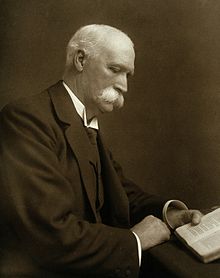William Macewen
| Sir William Macewen | |
|---|---|
 |
|
| Born |
22 June 1848 Port Bannatyne, Isle of Bute, Scotland |
| Died | 22 March 1924 (aged 75) Glasgow, Scotland |
| Education | University of Glasgow |
| Known for | Pioneering work in brain surgery, hernia surgery and bone grafts endotracheal anaesthesia pneumonectomy |
| Medical career | |
| Profession | Surgeon |
| Institutions |
Glasgow Royal Infirmary Western Infirmary Royal Hospital for Sick Children |
| Specialism | Neurosurgery, Orthopedic surgery |
| Notable prizes | Knighthood |
Sir William Macewen, CB, FRS, (/məˈkjuːᵻn/) (22 June 1848 – 22 March 1924) was a Scottish surgeon. He was a pioneer in modern brain surgery and contributed to the development of bone graft surgery, the surgical treatment of hernia and of pneumonectomy (removal of the lungs).
Macewen was born near Port Bannatyne, Isle of Bute, Scotland in 1848 and studied at the University of Glasgow, receiving a medical degree in 1872. He was greatly influenced by Joseph, Lord Lister (1827–1912), who revolutionised surgery by developing antisepsis, by the use of phenol, thus decreasing drastically the enormous mortality of surgical patients due to infections. By following Lister and adopting systematically the use of scrubbing (deep cleansing and disinfection of hands and arms), sterilisation of surgical tools, use of surgical gowns, and (recently discovered) anaesthesia, Macewen became one of the most innovative surgeons of his time and was able to greatly advance modern surgical technique and improve the recovery of patients.
...
Wikipedia
